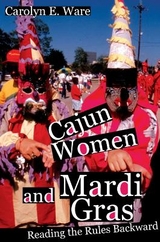
Cajun Women and Mardi Gras
Reading the Rules Backward
Seiten
2007
University of Illinois Press (Verlag)
978-0-252-03138-0 (ISBN)
University of Illinois Press (Verlag)
978-0-252-03138-0 (ISBN)
- Titel erscheint in neuer Auflage
- Artikel merken
Zu diesem Artikel existiert eine Nachauflage
How Cajun women have creatively refashioned the tradition of rural Mardi Gras runs
Cajun Women and Mardi Gras is the first book to explore the importance of women's contributions to the country Cajun Mardi Gras tradition, or Mardi Gras "run." Most Mardi Gras runs--masked begging processions through the countryside, led by unmasked capitaines--have customarily excluded women. Male organizers explain that this rule protects not only the tradition's integrity but also women themselves from the event's rowdy, often drunken, play. Throughout the last century, and especially in the last fifty years, women in some prairie communities have insisted on taking more active and public roles in the festivities. Carolyn E. Ware traces the history of women's participation as it has expanded from supportive roles as cooks and costume makers to increasingly public performances as Mardi Gras clowns and (in at least one community) capitaines. Drawing on more than a decade of fieldwork interviews and observation in Mardi Gras communities, Ware focuses on the festive actions in Tee Mamou and Basile to reveal how women are reshaping the celebration as creative artists and innovative performers.
Cajun Women and Mardi Gras is the first book to explore the importance of women's contributions to the country Cajun Mardi Gras tradition, or Mardi Gras "run." Most Mardi Gras runs--masked begging processions through the countryside, led by unmasked capitaines--have customarily excluded women. Male organizers explain that this rule protects not only the tradition's integrity but also women themselves from the event's rowdy, often drunken, play. Throughout the last century, and especially in the last fifty years, women in some prairie communities have insisted on taking more active and public roles in the festivities. Carolyn E. Ware traces the history of women's participation as it has expanded from supportive roles as cooks and costume makers to increasingly public performances as Mardi Gras clowns and (in at least one community) capitaines. Drawing on more than a decade of fieldwork interviews and observation in Mardi Gras communities, Ware focuses on the festive actions in Tee Mamou and Basile to reveal how women are reshaping the celebration as creative artists and innovative performers.
Carolyn E. Ware is an assistant professor of folklore and English at Louisiana State University.
| Erscheint lt. Verlag | 9.4.2007 |
|---|---|
| Zusatzinfo | 25 photographs; 3 line drawings |
| Verlagsort | Baltimore |
| Sprache | englisch |
| Maße | 152 x 235 mm |
| Themenwelt | Geisteswissenschaften ► Geschichte ► Regional- / Ländergeschichte |
| Sozialwissenschaften ► Ethnologie ► Volkskunde | |
| Sozialwissenschaften ► Soziologie ► Gender Studies | |
| ISBN-10 | 0-252-03138-5 / 0252031385 |
| ISBN-13 | 978-0-252-03138-0 / 9780252031380 |
| Zustand | Neuware |
| Informationen gemäß Produktsicherheitsverordnung (GPSR) | |
| Haben Sie eine Frage zum Produkt? |
Mehr entdecken
aus dem Bereich
aus dem Bereich
Erinnerungen
Buch | Softcover (2024)
Pantheon (Verlag)
16,00 €
Universalgelehrter, Polarreisender, Entdecker
Buch | Hardcover (2024)
mareverlag
28,00 €



